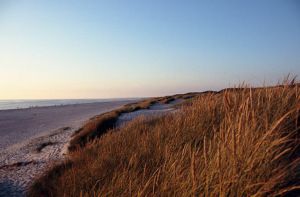News
Southern Danish beach may reopen after being closed for decades
This article is more than 9 years old.
Pollution has prevented bathing since the Beatles were just hitting the charts

A stretch of North Sea beach may reopen one day (photo: Andreas Schmidt)
A stretch of beach in southern Denmark located on the North Sea just north of the city of Esbjerg has been closed for bathing due to pollution since 1964.
Local authorities have started the long and expensive process of cleaning up the pollution that originated in the orchards at the Kærgård Klitplantage nature preserve by the North Sea, so the swimming ban can be lifted.
A long history of problems
The pollution in the area came from the notorious chemical production plant Grindstedværket, which dumped heavily-polluted wastewater in six major holes that it dug in the area.
The pollution dumped by the company seeped from the pits into the groundwater and then out onto the beaches and ultimately into the sea. For bathing to ever be permitted again along the 1,400 metre beach, the groundwater in the area will have to be purified.
According to the Southern Denmark Committee for the Environment, Soil and Raw Materials, the clean-up will take ten years and cost 100 million kroner.
Mutually beneficial
The environmental group hopes the costs can be spread around.
“I expect the public authorities, tourism industry and business community will have a moral and economic interest in getting the bathing ban lifted,” said the committee chairman, Jørn Lehmann Petersen.
READ MORE: Denmark’s largest ever environmental pollution case starting today
The Environment Ministry and local authorities in southern Denmark began the clean-up of contaminated soil in the area in 2007. It cost 50 million kroner and was announced as being completed last year.






































